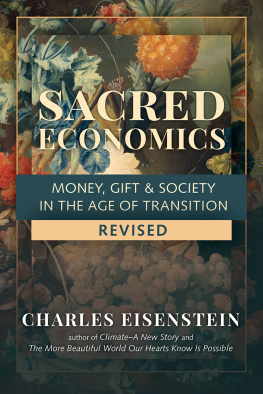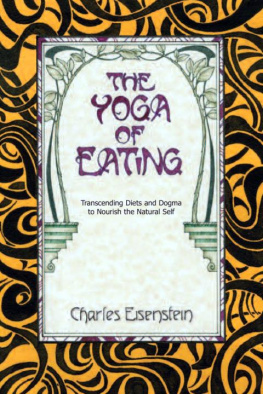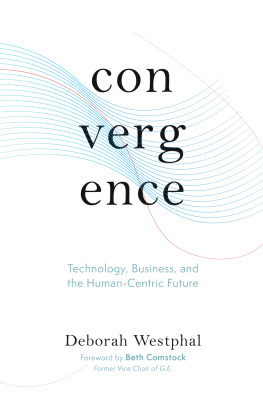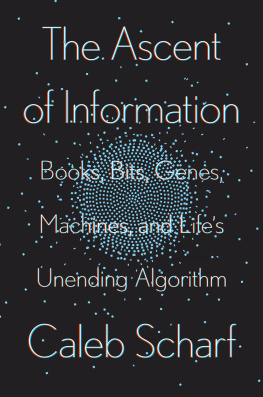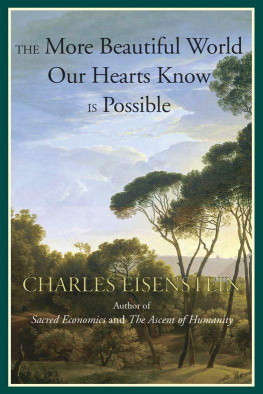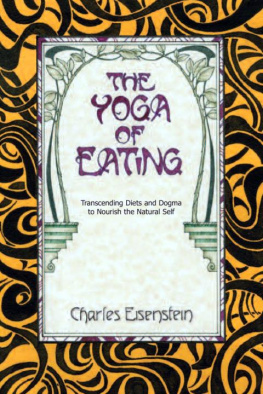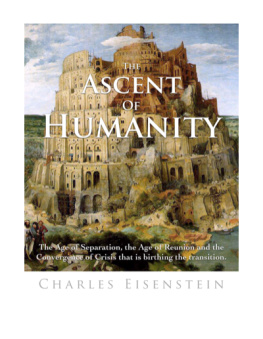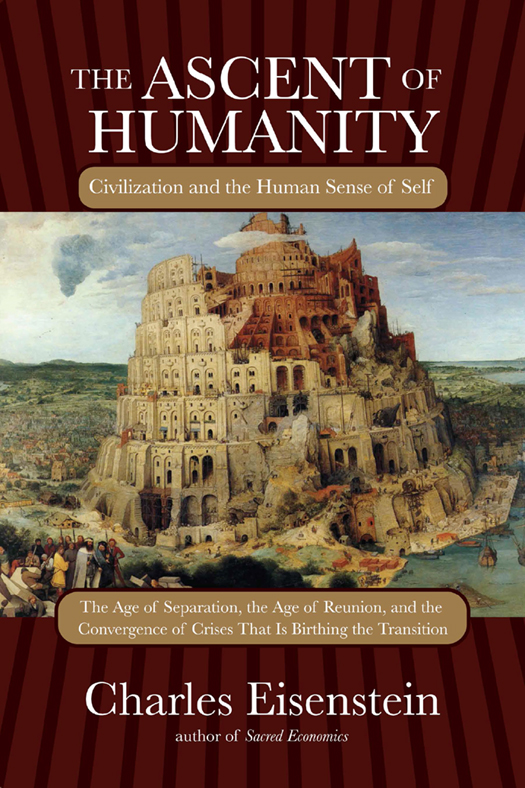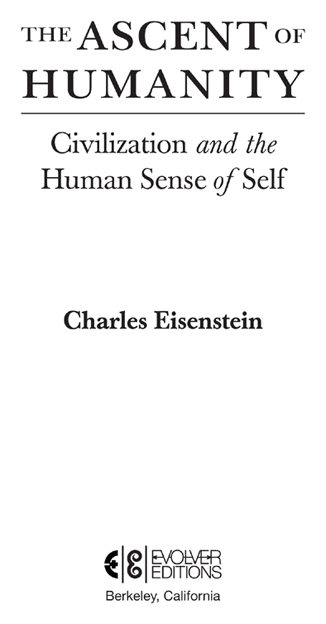P RAISE FOR C HARLES E ISENSTEIN S Sacred Economics
This brilliant and beautifully written book is an indispensable must-read for all those who believe our economic system is terminally sick and in need of radical, sacred rehaul. Charles Eisenstein has the great gift of being able to make complex ideas both thrilling and inspiring. I hope this book begins a serious, worldwide conversation on how we can reinvent our attitude to money.
A NDREW H ARVEY , author of The Hope: A Guide to Sacred Activism
While political pundits, financial analysts, and Occupiers fumble on how to transcend the intensifying global financial crisis, Eisenstein is trailblazing bold new ideas and possibilities for how we conduct monetary exchange.
J ONATHAN P HILLIPS , Huffington Post blog
I consider Charles Eisenstein one of the up-and-coming great minds of our time. Rarely have I met a person who combines such philosophical and spiritual depth with such practical insights into the cultural and institutional origins of the potentially terminal dysfunctions of modern societyand the potential solutions.
D AVID K ORTEN , author of The Great Turning
If you want a convincing account of just how deep the shift in our new axial age is and must be, look no further than this brilliant book by Charles Eisenstein, one of the deepest integrative thinkers active today.
M ICHEL B AUWENS , founder of the P2P Foundation
With his breadth of knowledge, enthusiasm, commitment, diligence, and sensitivity, Eisenstein has become a beacon of hope for others. Your heart and mind will be opened by this treasure of a book that shines with wisdom of crucial importance to our troubled world today.
K AMRAN M OFID , founder of the Globalisation for the Common Good Initiative
[Sacred Economics] meticulously explains why our current system will inevitably give rise to cyclical and worsening economic crises. [Eisenstein] exposes the myths and lies that sustain power structure, the social and spiritual devastation in which we are all complicit, and lays the foundation for a way of thinking that can restore hope and help us emerge to a positive future. Eisensteins book provides some of the most creative and hopeful ideas out there.
New Consciousness Review
A new economy means the old one needs to go. That would be scary news if not for Eisensteins optimistic way of describing the transition. He effectively argues that when we dismantle monetization, we give birth to community. Together, we can help noble impulses become profitable enterprises. Money may have caused our biggest problems, but redefining it could help us solve those same problems.
Grid magazine
If anything is sacred in this world, it is surely not money. So says Charles Eisenstein, who believes that people can act outside of the money economy, despite the power it has over their lives.
Foreword Reviews
Eisenstein is no revolutionary or anarchist. In fact, hes an evolutionary. While reading Sacred Economics, I realized I had not achieved an objective relationship with our money system. I dont have money. It has me.
Common Ground
Copyright 2007, 2013 by Charles Eisenstein. Some rights reserved.
This work is licensed under a Creative Commons Attribution-NonCommercial-NoDerivs 3.0 Unported License. For more information, please visit http://creativecommons.org/licenses/by-nc-nd/3.0.

| Published by Evolver Editions, an imprint of North Atlantic Books | Art direction and cover design by michaelrobinsonnyc.com |
| P.O. Box 12327 |
| Berkeley, California 94712 |
Cover art: The Tower of Babel, by Pieter Brueghel the Elder, 1563. Available from the Wikimedia Commons, http://commons.wikimedia.org.
The Ascent of Humanity: Civilization and the Human Sense of Self is sponsored by the Society for the Study of Native Arts and Sciences, a nonprofit educational corporation whose goals are to develop an educational and cross-cultural perspective linking various scientific, social, and artistic fields; to nurture a holistic view of arts, sciences, humanities, and healing; and to publish and distribute literature on the relationship of mind, body, and nature.
North Atlantic Books publications are available through most bookstores. For further information, visit our website at www.northatlanticbooks.com or call 800-733-3000.
The Library of Congress has cataloged the printed edition as follows: Eisenstein, Charles, 1967
The ascent of humanity : civilization and the human sense of self / Charles Eisenstein.
p. cm.
Summary: An exploration of the history and future of civilization, tracing the converging crises of our age to a common source: the ideology of the discrete and separate selfProvided by publisher.
Includes bibliographical references.
eISBN: 978-1-58394-537-7
1. Civilization, ModernPhilosophy. 2. Technology and civilization. 3. TechnologySocial aspects. 4. Nature and civilization. 5. Self (Philosophy) 6. Individualism. 7. Self-interest. I. Title.
CB478.E36 2012
306dc23
2012022889
v3.1
Dedicated to the more beautiful world our hearts tell us is possible
And they said, Come, let us build us a city and a tower, whose top may reach unto heaven.
C ONTENTS
A UTHOR S P REFACE
F or my entire life a foreboding of doom has lapped at the edge of my attention. Growing up during the last throes of the Cold War in the 1970s and 80s, my perceptions were colored not only by the threat of nuclear cataclysm, but also by the books on my fathers shelf that I began reading as a preteen: The Population Bomb, 1984, Silent Spring, Gulag Archipelago, A Peoples History of the United States. These books added gloom to the doom, a feeling of a deep wrongness in the world.
Perhaps this is why I experience such an odd mix of emotions whenever the latest symptom of financial, political, or ecological collapse comes onto my radar screen. On the one hand I feel dread; on the other, a kind of gratification or even gleeful excitement. I hope you will not think ill of me if I confess that sometimes, when a promising catastrophe fails to materialize, I feel a little disappointed.
Such contradictory feelings are common among those working to create a more beautiful world. We want the same thing that we fear: the end of our world and the beginning of a new. We realize that rebirth cannot come without death preceding it, that renewal comes only after loss. We are, quite naturally, afraid of that loss; we are afraid as well of the empty space in between loss and rebirth, when all that was familiar has fallen away and we know not what to do.
Those are the times of chaos, of unknowing, and of the breakdown of conventions so long-standing as to have taken on the status of reality. Today, even more than in 2007 when The Ascent of Humanity first appeared, it is obvious that such a time is drawing near. In the face of an ecological, financial, social, and health crisis that isnt going away, our toolspolitical, technological, and cognitiveare revealing themselves as impotent. As that happens, the belief systems that embed those tools lose the gloss we call reality. Our defining narratives are coming apart at the seams.



